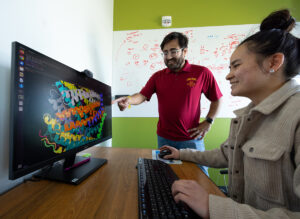Ratul Chowdhury, an assistant professor in the Department of Chemical and Biological Engineering (CBE), was recently named a Black and Veatch Building a World of Difference Faculty Fellow in Engineering.
Chowdhury and his research group develop AI-based novel computational platforms to study metal-protein interactions, unravel structural factors for viral infection across humans and animals, and image processing to analyze biological data across scales.
“We develop and deploy biologically aware AI-computing platforms to study existing protein structures and extract ground rules for their function. By weaving a carefully designed tapestry of advanced computing steps, we can use these ground rules to design new proteins for solving problems in energy, environment, sustainability, and health,” says Chowdhury.
“In addition to molecular simulations, we have a dedicated focus toward making utility-driven, open-source, web-based image processing tools. These can analyze complex biological images ranging from fluorescent tissue samples, drug release in whole organs, and can even rapidly tackle changes in organ sizes between healthy and diseases states,” he adds.
Innovation: A priority at Iowa State and Black and Veatch

A cornerstone of the fellowship is Black and Veatch’s belief in the need for innovation to address the long-term needs for safe, sustainable and responsible infrastructure.
“We honor the Black and Veatch goals in different ways,” Chowdhury remarks. “The applications of our work span multiple business aspects. On one end we are committed to design better protein products for the synthetic biology industry with the motto of improved living through better biochemistry; making better detergents, degrading plastic, synthesizing biopolymers. On the other end, we are interested in delivering the power of advanced computing toward human as well as livestock health through faster surveillance of diseases, understanding immuno-metabolic rationales, and intervention through advanced therapeutics.”
A wide range of research with Chowdhury lab
Chowdhury is a primary investigator for a grant funded by the Iowa Economic Development Authority that seeks to design novel microbes which can digest complex woody waste to convert it to precursors for high-value chemicals. He is also a co-investigator for a National Science Foundation-funded project for design of therapeutic molecules for emerging and re-emerging respiratory diseases. On another Department of Energy funded grant (through Ames National Laboratory), he is designing novel proteins which can sequester rare earth elements and recycle them into manufacturing magnets – which are key for supporting a better tomorrow through making electric vehicles and hard drives for data centers.
Learn more about the Chowdhury Lab and the team’s research.
Chowdhury joined the CBE faculty in 2022, and is also part of the Bioinformatics and Computational Biology interdepartmental program. He received a B.S. degree in chemical engineering from Jadavpur University, India in 2013. He earned his Ph.D. in chemical engineering from the Pennsylvania State University in 2019 and performed his postdoctoral research as a fellow at the Harvard Medical School, Department of Systems Biology, from 2020-2022.

